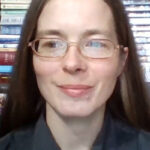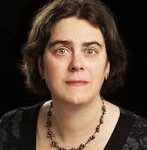The Logos & Literature:
Elaborating the Divine
[online evening talks]
29th April-8th July 2021 @7:30pm
Explore some of the great themes of Catholic Christianity,
in writing old and new
Online at 7:30pm every second Thursday, beginning 29th April. Talks last 45-60 minutes, followed by 30 minutes Q&A.
Please register at the bottom of this page for a link.
29th April

Rev. Dr Michael Halsall
Tolkien's Cosmology: Understanding Our World
JRR Tolkien’s mythical world captured the hearts and minds of millions. His world is one that speaks to us because it is anchored in a profound truth: that of a cosmos brought into being and continually guided, whilst simultaneously respecting the free choices of its creatures. Rev. Dr Halsall will explore the beauty of Tolkien’s vision as a reflection of the Catholic understanding of the cosmos, as defined in its relationship to the Creator.
Fr Halsall is a priest of the Personal Ordinariate of Our Lady of Walsingham, and teaches Philosophy at Allen Hall Seminary in London. Fr Halsall’s recent book – Creation and Beauty in Tolkien’s Catholic Vision – explores the philosophical themes in Tolkien’s crafted creation narratives, alongside those of the Christian tradition, influenced as they are by varieties of Christian Neoplatonism.
Searching for Truth: Fact and Fiction Today
Fiction plays a powerful role in the search for and perception of truth. Historical fiction offers a means of accessing the past, and contemporary fiction often helps to shape the way a society is perceived. Fiorella Nash will explore the importance of both genres in seeking and reclaiming truths both religious and about ourselves, and in a particular way, the role of the murder mystery genre in the search for truth and justice.
Fiorella De Maria is an Anglo-Maltese writer who grew up in Wiltshire, England and studied English literature at Cambridge University. A winner of the National Book Prize of Malta, she has published ten books including: Poor Banished Children, Do No Harm, We’ll Never Tell Them, A Most Dangerous Innocence and the Father Gabriel mysteries which have been described as “Miss Marple for the twenty-first century”. She lives in Surrey with her husband, four children and a dog called Monty.
Catechetical Poetry: Presenting Christianity in China
The beauty and structure of poetry presents a particular form of literature that is at once attractive and easily memorised. Roy Peachey will examine how Wu Li, one of the masters of early Qing Dynasty painting, used traditional Chinese verse to evangelise the people of China. Even after he became a Jesuit priest in 1688, Wu Li continued to paint and write poetry, using his elegant art to present the essentials of Christianity to the Chinese people at a time of great political and religious uncertainty. Despite the very different conditions in which it was produced, his work therefore offers an intriguing example for our own times too.
Roy Peachey was educated at Oxford, London and Lancaster universities, studying Modern History, English and Chinese Studies. He is has held several senior educational roles whilst teaching, and pubilshed a number of books, including 50 Books for Life: A Concise Guide to Catholic Literature.
Fiction as Formation: CS Lewis and the Chronicles of Narnia
The Chronicles of Narnia draw much of their depth from CS Lewis’ appreciation of the Christian vision of education and the liberal arts. Dr Rebekah Lamb will focus on the formative elements of Lewis’ fiction, with special emphasis on The Silver Chair.
Dr. Rebekah Lamb lectures at the School of Divinity, University of St. Andrew’s. She specialises in Religion and Literature from the long-nineteenth century to the present, with emphasis on the Pre-Raphaelites and their affiliate circles. Prior to St. Andrews Rebekah was an inaugural Étienne Gilson Post-Doctoral Fellow at the University of St. Michael’s College (USMC) in the University of Toronto and also taught Literature and Humanities Studies at Our Lady Seat of Wisdom College (SWC) in the Ottawa Valley.
Educating in Virtue: Appealing to the Young Mind
Stories are a fundamental and important means of communicating principals and actions by which to live life: namely morality and virtue. They have played a central role in education in every civilised society, adapting to the specifics of each era and place. Acclaimed author, Corinna Turner, will explore the challenges of presenting and exemplifying virtues in literature to the modern, young mind.
Corinna Turner is the Carnegie medal nominated author of the I Am Margaret series, The Boy Who Knew (Carlo Acutis), and other works for young adults and adults. She is a Lay Dominican, and lives in the UK.
Inspiring Heroism: Counter-Reformation Catholicism and English Drama
The Catholic Church’s response to the challenges posed by the Reformation was often embodied in drama and performance. Even among England’s persecuted Catholics, cultural activity of this kind occurred: secretly or discreetly on the mainland, and more openly in plays put on by the colleges set up on the Continent to educate English youths. Both at home and abroad, such plays encouraged Catholics to hold onto tradition, and celebrated saints and martyrs in a way intended to inspire both actors and audience.
Prof. Alison Shell is Professor of English at University College London, and runs the MA in English: Shakespeare in History. She is an editor and critic, reviewing for the Times Literary Supplement, the Church Times and a number of academic journals. Principal works include: Catholicism, Controversy, and the English Literary Imagination, 1558-1660 (1999), Oral Culture and Catholicism in Early Modern England (2007), and Shakespeare And Religion (2011)
***Admission is free. We kindly request a donation to support the costs of our activities.***
Please register below:
![]()





